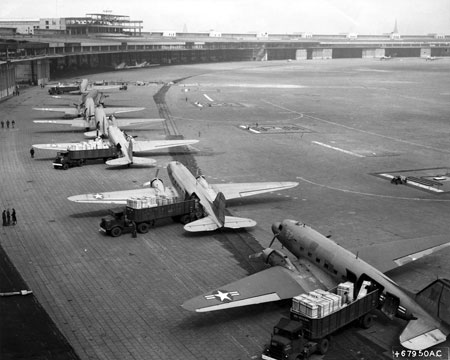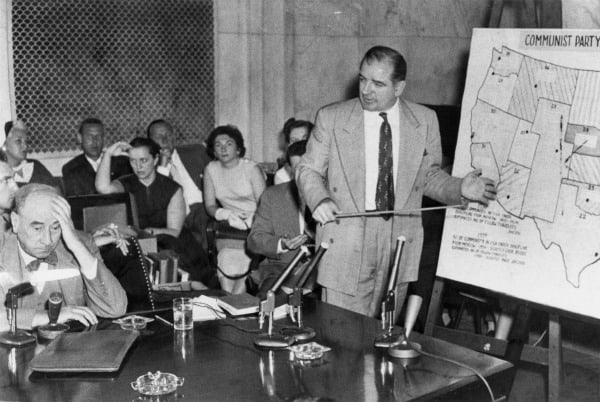Recalling feelings associated with specific events during those formative years (1939 -1961) requires delving into important events of the times. These background happenings occurred at the end of the Great Depression, during WWII, over the long Russian Communist threat to the nation, including its first successful bomb test of a nuclear device in 1949 and the successful launch of the Sputnik satellite in 1957.

These notable headlines formed our background set of international events. Included in this list of important related events were the Berlin Airlift, the McCarthy hearings, HUAC, the Red Scare, and the Hungarian Revolution. For anyone interested in world events, this period provided much to ponder.
On the home front, our emotional focus was usually placed on agreements and some misunderstandings within the Charbonneau-Bolduc-Ouellette interconnected households. This brouhaha, sometimes, made us ponder whether Jean-Paul Sartre may have been right when the main character of his novel, “No exit” states that,

Between any two persons, there always appears some difference of opinion on how the world ought to run to reach a satisfactory result. For us, our interlocked families came into near-daily contact with one another, which gave everyone the opportunity to see, feel and hear the anxiety and, occasionally, the joys in the lives of the many players, about 25 to 27 individuals, who were distributed among the three French-Canadian ghettos of the city.
Here, it is important to note that the term “ghetto” is used as is usually the case in Western Europe. According to Merriam-Webster, the principal definition of a ghetto is the following:
A quarter of a city in which members of a minority group live, especially because of social, legal, or economic pressure
In the Lowell sense of the word, this concept usually resulted from the self-imposed segregation of members of an ethnic, religious, or language minority group to a contiguous area of the city’s physical geography. The boundaries separating one ghetto group from another were generally fluid, with patches of amicable overlap here and there.
Waxing philosophical, then, it seemed evident that “birds of a feather flock together”. Or as the French might have said: “Qui se ressemblent, se rassemblent”
In this way of looking at things, someone considered by society as being middle-class might share a “ghetto area” with neighbors, who are much less prosperous. To sum it is up, ghetto does not imply poverty, but rather cultural and linguistic isolation.
Greek, Irish, French-Canadian, Polish, Romanian, Jewish, Portuguese, etc.
First-generation immigrant families of all types had a habit of sticking together for financial and emotional security and the reassurance of seeing their close relatives adapt to foreign customs and the English language while clustered in defined neighborhoods or enclaves located adjacent to similar enclaves that housed other foreigners like Greeks, Irish, Polish, Jews, Portuguese, etc.
Shopping in and out of one’s Cultural Neighborhood
Each neighborhood had its basic service providers such as grocers, restaurants, milkmen, bakeries, pharmacies, shoe shops, undertakers, and ethnic churches. Except for essential, weekend visits downtown to trade at large department stores like the Bon Marche, and Pollard’s, a national-brand supermarket like A&P or Brockelman’s, a super-sized butcher shop at Kearney Square, or a family doctor or dentist, there was little reason to ever leave one’s own enclave except for traveling to work, of course.
Hardly anyone owned a personal automobile, so strangers of all types could meet and, sometimes, greet each other informally while traveling to a job site on the city bus. It remains unclear whether any interethnic friendships ever developed through these transit interactions, however. The local bus line provided dependable service, Monday through Saturday from 6:00 AM to about 9:30 PM, with later hours on Thursday through Saturday to accommodate evening shoppers.
Sources of Information – Newspapers, Magazines, Radio, Church Bulletins
Of course, nobody in this large circle of family relations ever read any international texts on philosophical, socioeconomic, or political histories that had marked the development of the present world drama. But, news from the outside world did filter down to us, who were living and working in Spindle City, AKA, Lowell, Massachusetts. These news items came to our consciousness through the newsreels shown at the movie houses, our town newspaper, “The Lowell Sun”, the local radio station, WLLH, and the Readers’ Digest magazine, which my mother enjoyed reading. Naturally, Church news like papal decrees and comments from Archbishop Richard Cushing of Boston also had a strong influence on our daily lives.
More Reliable Literary Sources
Now and again, when visiting the barbershop, a young lad might pick up a copy of Sports Illustrated, Popular Mechanics, Life or Look magazine plus find a raft of comic books like Superman, Dick Tracy with his speaker-watch, Mad comics, Bugs Bunny and Donald Duck. For us, boys from Lowell, the local barbershop became an enticing, literary center very much like the Boston City Library or the Library of Congress, but on a less impressive scale.
Of course, the Sunday sermon at the Eglise St-Louis on West 6th Street also underlined for us the sins of the flesh associated with all sexual activity using any form of birth control. However, “Vatican Roulette” when employed by married couples was okay. The 1950s were certainly years of limited, sexual freedom, particularly in Massachusetts, for anyone, and especially Catholics, who were dealing with an active libido. Before my discovery of the ample supply of the world’s literary treasures found at the Lowell Public Library (now the Pollard Library) located in the magnificent City Hall Building downtown at the V-shaped intersection of Merrimack and Moody Streets,.
it might be said that the time that elapsed from my birth in January 1939 to January 1953 when my father died, were years of near-total encapsulation away from the rest of the city, the state of Massachusetts, and the North American Continent. We all experienced life in a time-space bubble akin to Rod Serling’s Twilight Zone, but without the scary music, which first happened when I was in the eighth grade (1952). Perhaps, we were not well-informed about the real world of business and politics. Nobody read “The New York Times”, “The Wall Street Journal”, “The Economist”, etc. In a very real sense, the outside world did not matter to us. Although quite provincial, this was our world, and we adapted to it seemingly well. Actually, it was only in late-1953 that a new black-and-white TV set even found a home in our living room although a next-door neighbor, Alice Beauparlant, and my aunt and uncle, the Charbonneaus on Fisher Street, each obtained a set, a year or two before us.
Political Affiliations
I don’t believe that any relative or family friend ever had a positive word to say about Democrats at any level of government. Hard-working, French-Canadian, manual laborers, and local retail merchants seemed to be in resolute agreement regarding the lack of character and the generally odious nature of any person expressing any Democratic opinion, attitude, and comment. Perhaps, the barren, Depression years (1929 to 1939), which were highlighted by business failures, bank closings, despair, hunger, fatigue, fear, crumbling buildings, hopelessness, suicides, and general unemployment had taken a nasty toll on the usual, can-do attitude of poor, blue-collar manual laborers and, also, the nearly bankrupt, retail shop owners, who tried to stay above water and also assist in reducing the misery quotient of their regular customers.
The grownups in my young years had been through hell and back. It had not been a pretty picture, and, maybe, the Democrats were really to blame? Roosevelt was a Communist according to my grandfather, Paul Charbonneau, the owner-operator of North End Dairy on Hildreth Street. My mother called President Harry Truman, “That crude, little man”, a searing comment that only brought general satisfaction to the ears of anyone within hearing distance.
These Democrats were political scum-bags in Boston politics and elsewhere, Lowell and Washington, D.C. included. A convicted serial killer might have been better embraced by my family members than one of those Democrats. Personally, I easily learned to mistrust and despise these people proving, I suppose, that political osmosis can work wonders in getting new believers into the ranks
More on these sensitive issues, later.
